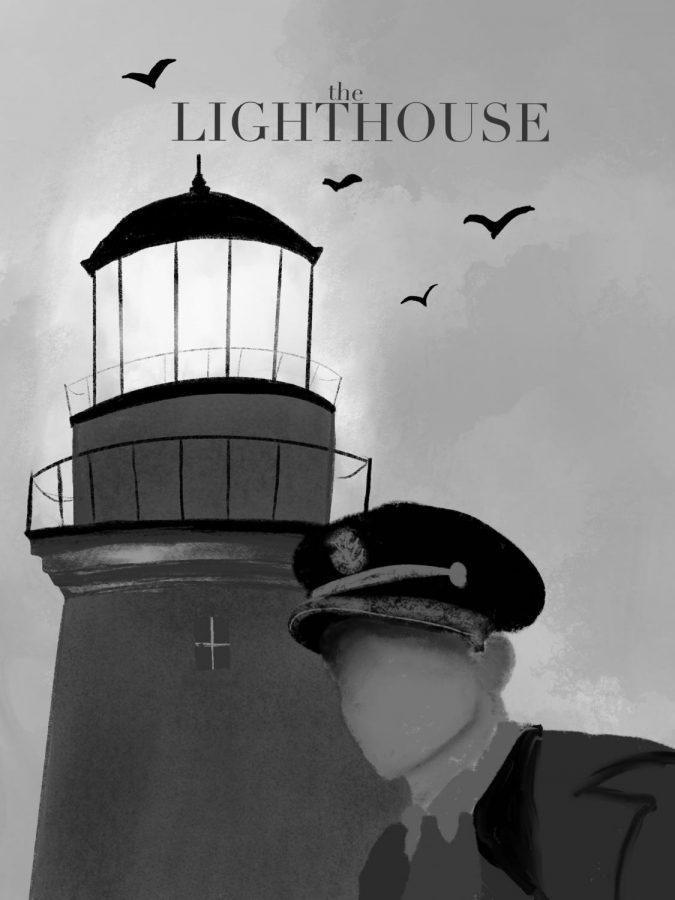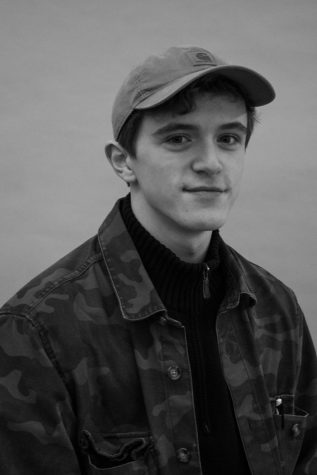High Tide and Higher Tensions
“The Lighthouse” Shines Through Murky Waters
“The Lighthouse” features Robert Pattinson and Willem Dafoe.
January 2, 2020
Rating: 4.5/5 Falcons
To say that my head was entirely scrambled after both of my viewings of The Lighthouse, directed by Robert Eggers, is nothing but a credit to its ability to disorient and submerge you in its saltwater flavor of hallucinatory horror. Holding the audience as captive as its characters, the film aims to slowly whittle down the viewer like a bar of soap by never showing anything too soon, but still showing enough to let the mind wander to its own conclusions. It’s fairly easy to get lost in the logic of The Lighthouse. But then again, nightmares are rarely supposed to make sense.
Very much anchored by the two headlining performances of Winslow (Robert Pattinson) and Thomas (Willem Dafoe), there isn’t much plot to be found, only discoveries to be made along the way. Working as “Wickies” (lighthouse keepers) off the frigid New England coast, our characters arrive at what must be hell at sea, as the more desolate the lighthouse, the better the pay is. After this, we see the previous lighthouse keeper’s departure, and with that person, the last of the outside world. As the island seems to drift further still from the mainland, Winslow and Thomas have no one to turn to but each other. All the while you begin to wonder who’s actually losing their mind, Thomas, Winslow, or the viewer. It’s when their Bar Harbor accents begin to fill with violent intention that you see the true absurdity is found in the two men, not in their surroundings. Whether or not you are able to predict the film’s plot, it is the experience of watching the two men spiral downward that is the true spectacle of Eggers’ work. Without a three-act story to speak of, or anywhere else to go on this rock, the structure of the film is built as a slope, where each new level of depravity comes with its own sensations.
While The Lighthouse doesn’t have all the ingredients to make an honest horror movie, which Eggers pulled off so well in The Witch, the comedy here takes center stage. Many scenes can be quite shocking, even disturbing, but it’s often with a level of comedy beneath. By giving the film a sense of humor, and such an immature one at that (how is a steak in any way surrogate for a woman?) Eggers ensures there isn’t a dull moment or break to the hypnotic spell he’s achieved. His lens hovers and lurks around scenes, placing you exactly where you don’t want to be. With the help of a perfectly squared aspect ratio, you fall into a sort of trance just as deep as the waters swallowing the island.
Thankfully, The Lighthouse leaves itself up to interpretation, maybe knowing too well that a definitive end to insanity can never really arrive. Much in the vein of The Shining, you could interpret the story almost any way you try; as the imagination of a guilty conscience, or the hazards of isolation, or anything save a literal reading of events as you see them. In looking to find what is real and what’s a trick of the mind, you’d be misunderstanding the uncertainty the film is built around. It’s the unknown that makes The Lighthouse a descent into a rapidly unhinging mind, and the attempt to make sense of what’s fickle and illogical to begin with.
This piece also appears in our December 2019 print edition.










